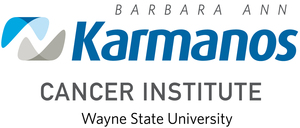DETROIT, April 8, 2013 /PRNewswire-USNewswire/ -- Ulka Vaishampayan, M.D., leader of the Genitourinary Oncology Multidisciplinary Team at the Barbara Ann Karmanos Cancer Center, has contributed to an article just published in The New England Journal of Medicine comparing two different therapeutic methods in the treatment of metastatic, hormone-sensitive prostate cancer that becomes unresponsive to traditional methods of therapy.
(Logo: http://photos.prnewswire.com/prnh/20071106/KARMANOSLOGO)
The article is titled, "intermittent versus Continuous Androgen Deprivation in Hormone Sensitive Metastatic Prostate Cancer Patients: Results of S9346 (INT-0162) an International Phase III Trial." Fellow authors come from across America and internationally. The lead author, Maha Hussain, M.D., is from the University of Michigan.
The Phase III trial began in 1995 and was completed in 2008 though patient follow-up has continued since completion. A total of 3,040 patients were accrued for the trial and 1,535 patients were randomized into receiving either complete androgen-deprivation therapy or intermittent androgen-deprivation therapy. Karmanos researchers recruited 112 patients onto the clinical trial, which represents one of the largest single institution accruals, according to Dr. Vaishampayan.
The objective of the trial was to determine whether survival using intermittent androgen deprivation would provide better survival rates and quality of life for men compared to continuous androgen deprivation. Prostate cancer is an androgen-dependent disease and continuous androgen deprivation has been the standard therapy for metastatic (cancer that has spread), hormone-sensitive disease. Androgen is a male sex hormone, which includes testosterone.
Researchers ultimately determined that intermittent androgen deprivation does not achieve comparable survival rates compared to complete androgen deprivation therapy, though it does provide small improvements in quality of life (i.e. emotional well-being and sexual function) for men with prostate cancer, but only in the first three months of receiving the intermittent therapy.
Previous studies showed that intermittent androgen deprivation had prolonged the time between disease diagnosis and development of 'castrate-resistant' disease.
All patients on the trial had a form of prostate cancer that is referred to as 'castrate-resistant,' a stage of prostate cancer when the traditional testosterone suppression treatment is no longer effective against the cancer.
Dr. Vaishampayan noted that all men who are diagnosed with metastatic, hormone-sensitive prostate cancer on androgen deprivation become castrate-resistant within a median of 18-24 months after their initial diagnosis. The study established parameters for assessing the risk factors of early onset castrate-resistant disease, she said.
"The information that complete androgen deprivation and intermittent androgen deprivation have different survival outcomes should be an important factor during patient and physician discussions and decisions regarding the risks and benefits of androgen-deprivation therapy," Dr. Vaishampayan said. "This national trial addressed an important question and involved tremendous effort, patients and collaboration.
"I am proud to represent a fine institution like Karmanos Cancer Center, which is committed to clinical research for improving outcomes in patients with prostate cancer," she added. "I am indebted to the patients who enrolled in this trial and, in turn, helped countless others afflicted with the disease. Karmanos' clinical trials staff also was very dedicated to the cause and worked tirelessly to help us achieve our goals."
About the Barbara Ann Karmanos Cancer Institute
Located in mid-town Detroit, Michigan, the Barbara Ann Karmanos Cancer Institute is one of 41 National Cancer Institute-designated comprehensive cancer centers in the United States. Caring for nearly 6,000 new patients annually on a budget of $265 million, conducting more than 700 cancer-specific scientific investigation programs and clinical trials, Karmanos is among the nation's best cancer centers. Through the commitment of 1,000 staff, including nearly 300 physicians and researchers on faculty at the Wayne State University School of Medicine, and supported by thousands of volunteer and financial donors, Karmanos strives to prevent, detect and eradicate all forms of cancer. Its long-term partnership with the WSU School of Medicine enhances the collaboration of critical research and academics related to cancer care. Gerold Bepler, M.D., Ph.D., is the Institute's president and chief executive officer. For more information call 1-800-KARMANOS or go to www.karmanos.org.
SOURCE Karmanos Cancer Institute
WANT YOUR COMPANY'S NEWS FEATURED ON PRNEWSWIRE.COM?
Newsrooms &
Influencers
Digital Media
Outlets
Journalists
Opted In





Share this article